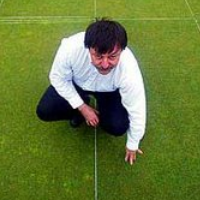Pesticide Companies Use Clever Loophole to Avoid Regulation of Genetically Modified Grass
 Scotts Co. scientist Bob Harriman looks over genetically engineered grass (AP Photo)
Scotts Co. scientist Bob Harriman looks over genetically engineered grass (AP Photo)
The biotechnology industry has found another use for pesticide-resistant gene technology by putting it in grass seeds, and in the process, completely avoided federal regulation of this new genetically engineered (GE) product.
Soon, lawns and farms across America could consist of Scotts Roundup-Ready Kentucky Bluegrass (whether people want it or not), designed to withstand “massive amounts of Monsanto’s Roundup herbicide,” according to EcoWatch.
Monsanto and Scotts managed to get their GE grass on the market without approval from the U.S. Department of Agriculture (USDA) due to loopholes in federal law.
Ordinarily, GE crops come under federal regulation as long as they contain genetic material from “plant pests”—the beings that the gene manipulation are designed to resist.
But Scotts decided to use DNA from other plants in creating the new kind of Kentucky bluegrass, along with other techniques that avoided triggering the USDA to step in and require testing, as well as its approval, before the grass could be sold to consumers.
EcoWatch’s Charlotte Warren and Ronnie Cummins warn that because of bluegrass’ light pollen, the grass can easily spread to neighboring properties. Once it does, the GE version will genetically merge with existing grasses—including organic ones that farmers rely on to produce organic meat, for example.
“As these seeds spread and more and more grass takes up that genetic trait, we’ll find organic farmers who want to grass feed their beef, can’t do it because their grass is genetically modified, which is prohibited in organic standards,” Bill Duesing of the Northeast Organic Farming Association wrote for CT News Junkie. “GMOs are pollution with a life of its own.”
Warren and Cummins noted that research has shown that GE grass eaten by animals has a “devastating impact” on their health, whether they be “prized horses” or cattle raised for the meat market. The journalists also predict that the use of GE grass will lead to increased use of the widely used herbicide Roundup, which contains the ingredient glyphosate, said to cause numerous diseases, from Parkinson’s to cancer.
-Noel Brinkerhoff
To Learn More:
GMO Grass: Coming to a Lawn Near You? (by Charlotte Warren and Ronnie Cummins, EcoWatch)
USDA Responds to Regulation Requests Regarding Kentucky Bluegrass (Animal and Plant Health Inspection Service)
Your Tax Dollars at Work…State Dept. Lobbies Abroad for Monsanto Biotech Seeds (by David Wallechinsky and Noel Brinkerhoff, AllGov)
- Top Stories
- Unusual News
- Where is the Money Going?
- Controversies
- U.S. and the World
- Appointments and Resignations
- Latest News
- Trump Renames National Football League National Trump League
- Trump to Stop Deportations If…
- Trump Denounces World Series
- What If China Invaded the United States?
- Donald Trump Has a Mental Health Problem and It Has a Name






Comments